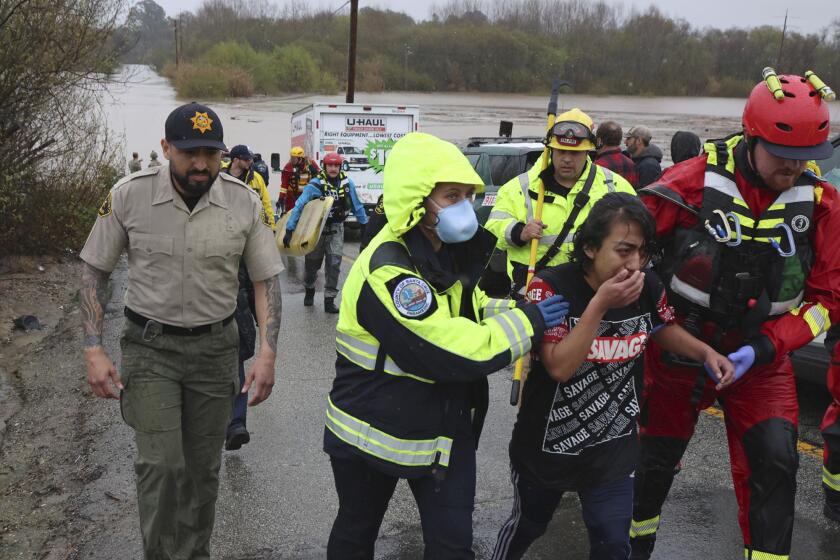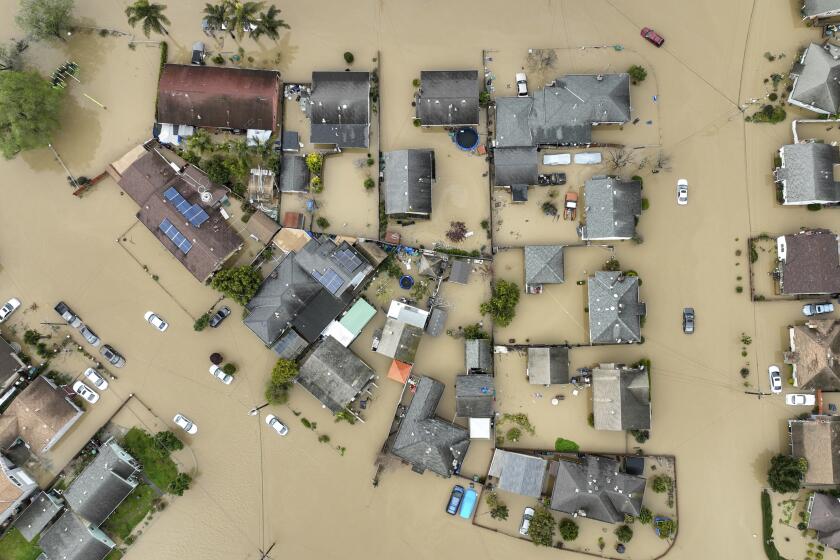Battered by destructive flooding, California braces for another atmospheric river storm
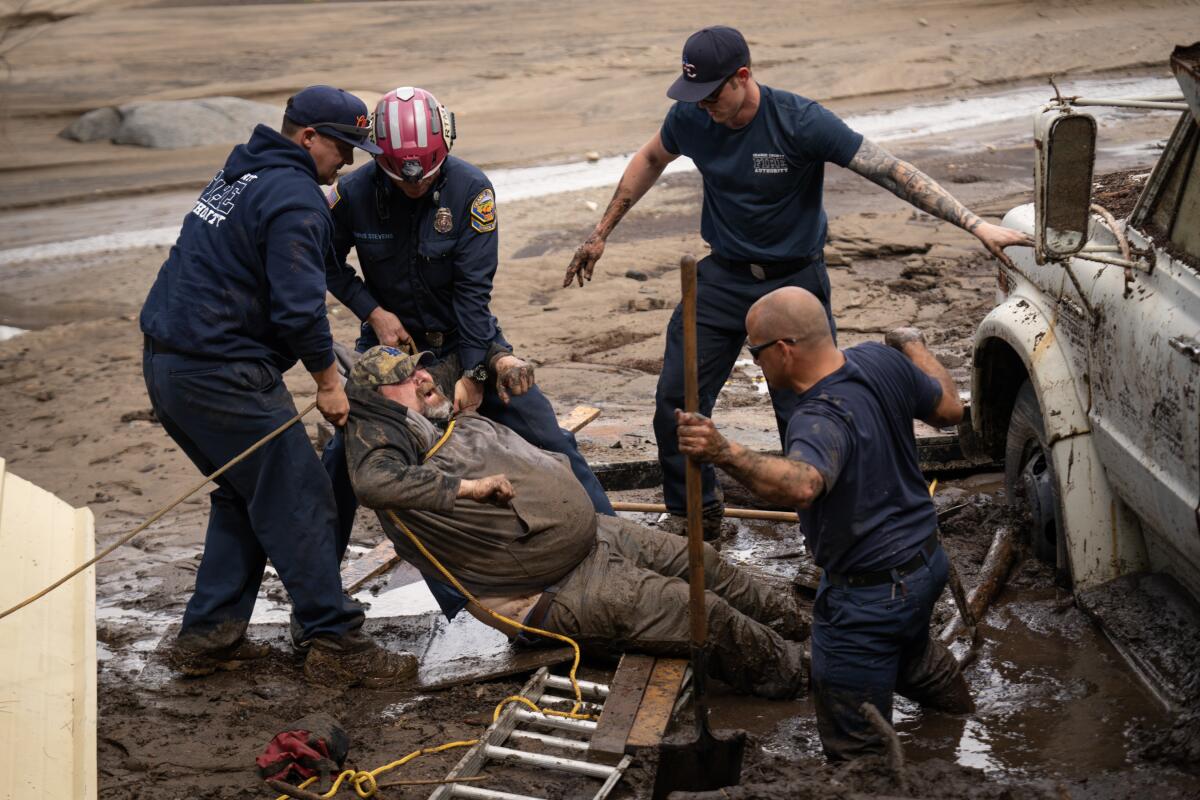
PAJARO, Calif. — California was bracing for another round of rain beginning Monday as officials tried to assess the damage from severe flooding along the Central Coast and Central Valley, which left scores stranded and whole blocks under water.
A levee failure on the Pajaro River in Monterey County — three miles upstream from the town of Pajaro — triggered massive flooding in and around the farming town and prompted evacuations.
More than 5,000 people in Monterey County were under an evacuation order or warning on Sunday, with more than 400 people sheltering at the Santa Cruz County Fairgrounds, a recreation center and a Salinas church. As of Sunday afternoon, more than 2,000 people had already been evacuated, mostly out of the Pajaro area, Sheriff Tina Nieto said.
Flooding or mudslides had shut down several stretches of the highways Sunday morning around Watsonville in Santa Cruz County, including Highway 1 and both eastbound and westbound and State Route 152. Monterey County remained littered with road closures from flooding, downed trees or power lines, and storm damage and debris. And flooding also led to the closure Sunday morning of another major artery in the Bay Area — Interstate 880 in Fremont.
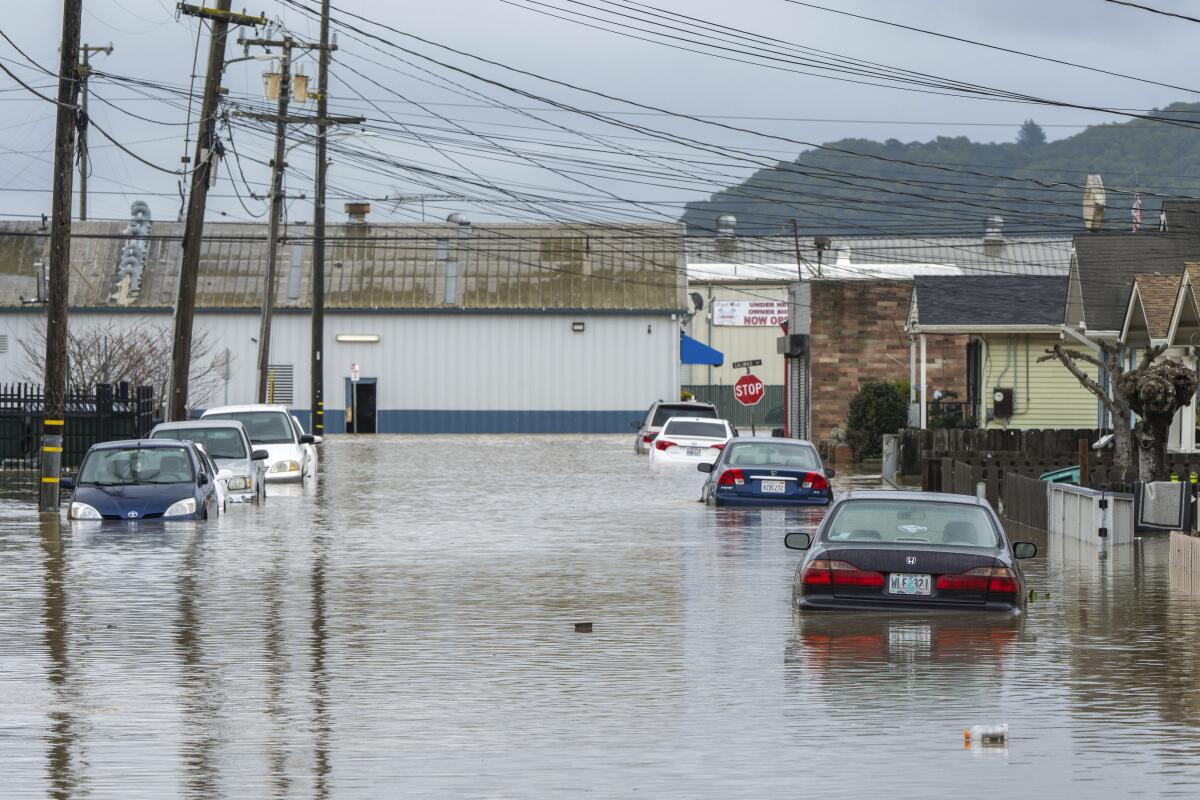
Yet another atmospheric river will bring new flood concerns to Northern California beginning Monday and continuing through Tuesday night.
The Salinas River continued to rise in Monterey County, prompting evacuation orders in the region northwest of Spreckels on Sunday night. Officials predict the river will crest at Highway 68 in the early hours Monday, which could cause significant flooding in nearby agricultural land.
“The Salinas River’s behavior is unpredictable and coupled with the recent storms and the Pajaro River flooding we ask you to be prepared and plan for changing circumstances,” officials wrote in a news release.
California emergency officials said Sunday that they were already coordinating plans to position flood fighting personnel, including swift water rescue teams.
“We’re mapping where the next storm is going to hit and putting resources” — firefighters, National Guard crews, high water vehicles — “in areas where the storm is going to be most severe or where there are already rivers that are swollen, so that if something does happen, you can quickly get in and rescue people,” said Brian Ferguson, spokesperson for the Governor’s Office of Emergency Services.
State officials are eyeing areas that could be affected and doing outreach ahead of the next round of storms to “our most vulnerable Californians” who may be hit harder or need more time to evacuate, including people who are older, disabled, homeless or speak English as a second language, Ferguson said.
The Bay Area saw bands of rain showers and thunderstorms Sunday, but “the focus is going to be on the next atmospheric river that arrives Monday evening,” said Patrick Ayd, a meteorologist with the National Weather Service. A flood watch and high wind warning were slated to go into effect for the Bay Area and Central Coast starting Monday evening.
Weather officials warned that high winds along the water in the Bay Area beginning Monday night “could capsize or damage vessels and reduce visibility.”
The upcoming storms are expected to hit the same areas as the last round, Ayd said, with the worst impact at higher elevations.
In the aftermath of the recent storms, “we have very saturated soils, which will make us even more prone to flooding,” and power outages are expected, especially around Monterey, Ayd said. Rock and mudslides are also possible.
Thunderstorms and heavy rain caused some flooding in Fresno County on Sunday evening, but forecasters are already looking to the next storm system that will roll in starting Monday, bringing as much as 6 inches of rain at higher elevations in the region.
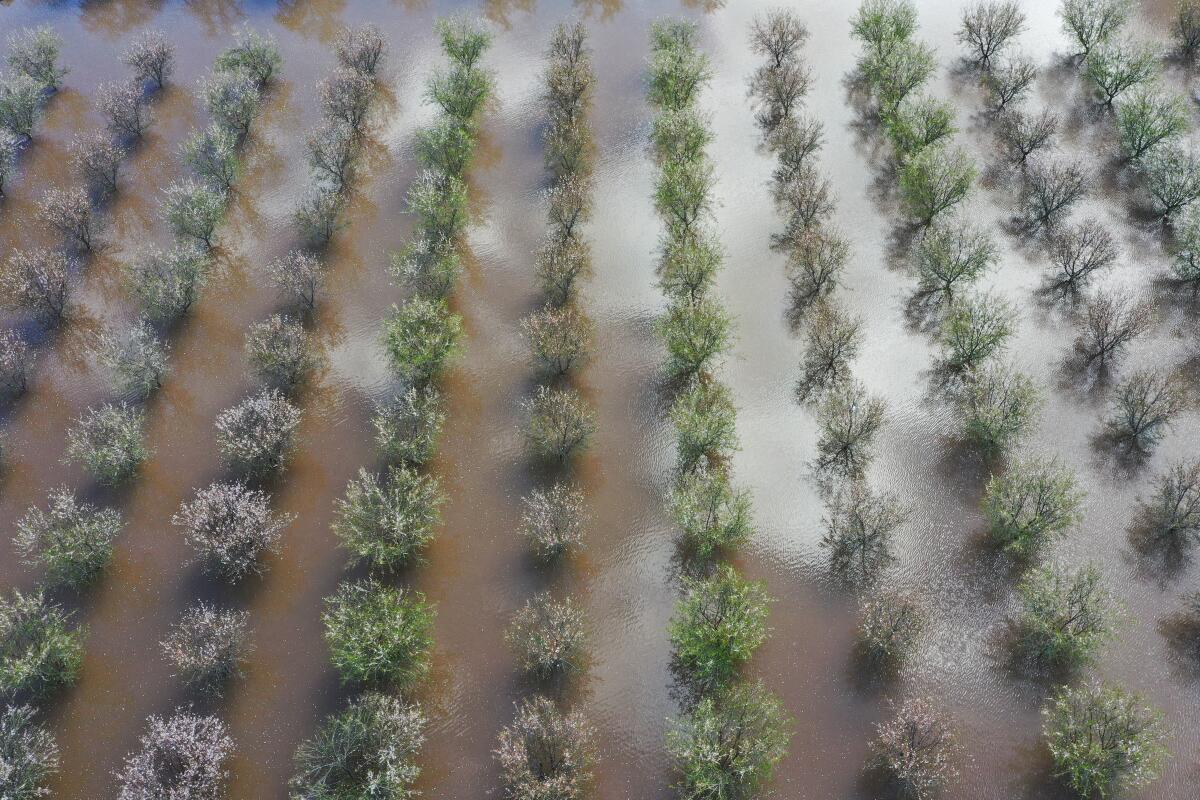
Jim Bagnall, a meteorologist with the weather service in Hanford, said rivers and creeks “are already running high, so this additional water on top of that makes flooding our main concern,” especially in the Springville area in Tulare County northeast of Porterville.
“Anywhere up there in the hills is going to be of concern,” he said. Bagnall urged residents to “pay attention to the forecast. Listen to the local officials. And if they are told they need to get out, heed the advice of the local officials there.”
The California Governor’s Office of Emergency Services warned Sunday that as rain, mountain snow and gusty winds descend on Northern and Central California, flooding and power outages could follow. It recommended that people keep emergency kits at home, have their vehicles full of fuel and sign up for emergency alerts.
Ferguson said that as one storm follows another, “these disasters really do build upon each other,” ramping up the risk that levees will give way. Across the state, emergency officials are also grappling with concerns about water contamination; roofs collapsing from snow in the Sierras; plans for sustaining nursing homes and other facilities if power goes out, and the future toll of mold in now-flooded homes, he said.
“We are more used to having wildfires in this state,” he said. “Floods are in many ways more challenging.”
A levee failure on the Pajaro River in Monterey County triggered massive flooding and prompted hundreds of evacuations and dozens of water rescues.
Southern California will see rain Tuesday and Wednesday, with flooding possible in Santa Barbara and San Luis Obispo counties, according to the National Weather Service.
“This next atmospheric river event is not looking like it’s going to be as strong, but when you have a flood on top of a flood, it just makes a bigger flood,” said Cindy Kobold, a meteorologist with the National Weather Service. “That means this next one could be more impactful, because the ground is way overly saturated, and we’re going to have additional rainfall, with gusty winds.”
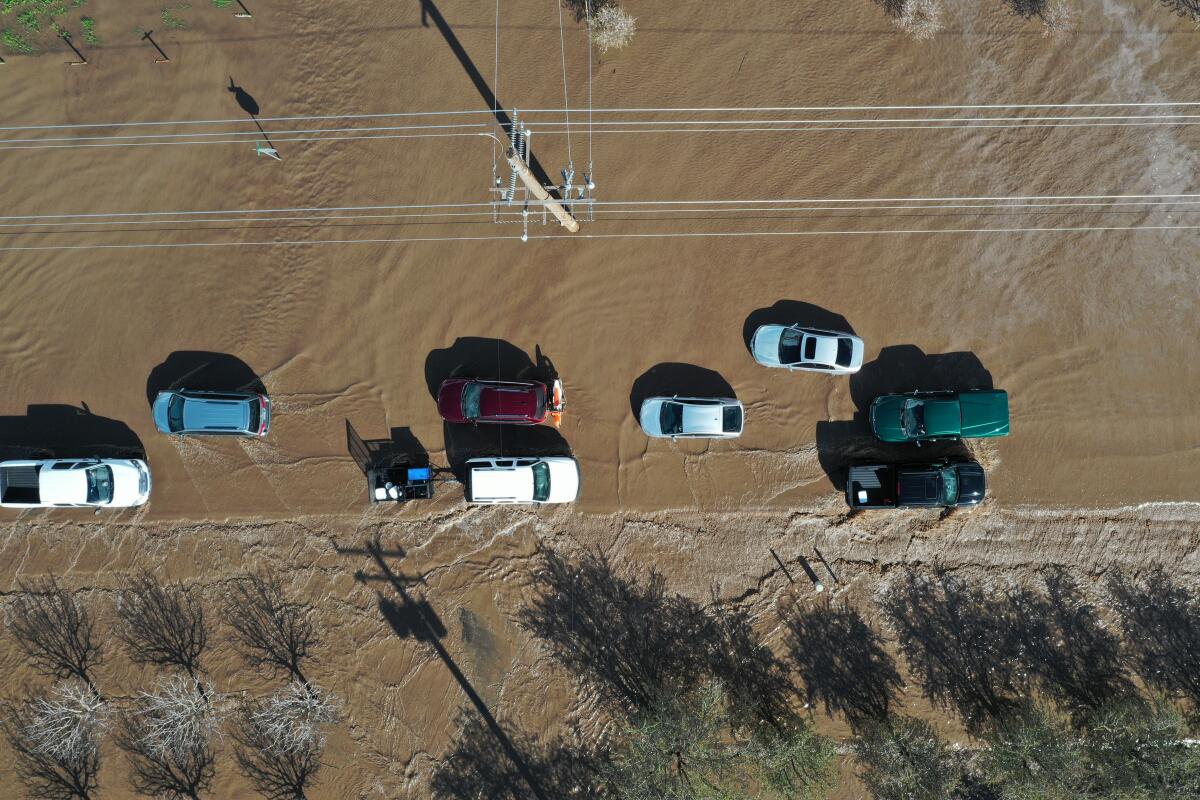
The biggest impact of the most recent storm has been in the town of Pajaro, with a population of 1,700, mostly farmworkers.
The levee on the Pajaro River breached late Friday night, said Nicholas Pasculli, a Monterey County spokesperson. Patrols noticed “bubbling up in the adjacent farmland” at 11 p.m., the first sign of trouble.
The levee failed around midnight. The failure is approximately 300 feet wide and workers are bringing in rocks and other materials to stabilize the breach before the next storm arrives, Pasculli said.
Andres Garcia, 39, said this was his third evacuation from Pajaro because of the flooding river: another in January and one in 1995, when the town was flooded “even worse” than now.
Flash flood warnings remain in effect for parts of Santa Cruz, Monterey, Tulare and Sonoma counties, according to the National Weather Service.
He, his wife and 8-year-old daughter left the city early Saturday, after they got a knock on the door from a sheriff’s deputy who urged them to evacuate. Garcia said they left before the water got too high, and he had no idea about the condition of his house.
His neighbor Laura Garcia left after dawn. She showed a video of water sloshing through her house — lapping against a crib, dining room set and shelves.
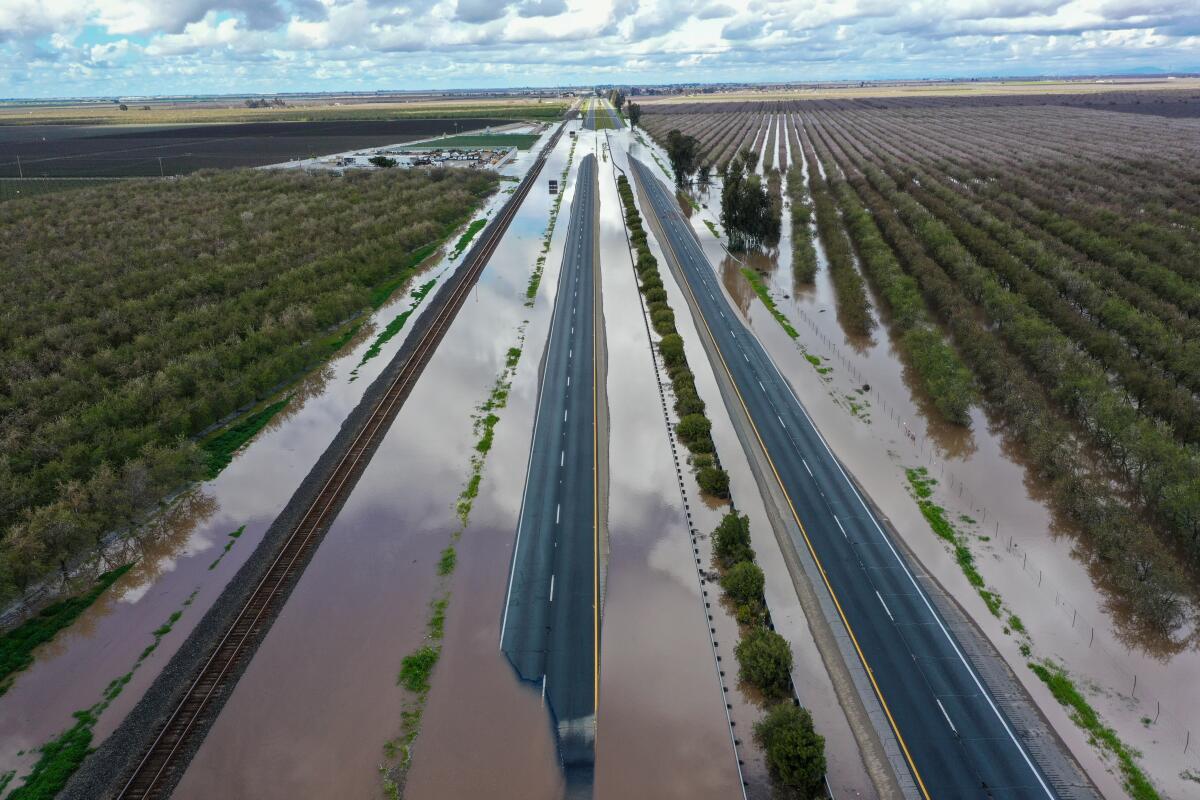
Andres Garcia said many farmworkers will be out of a job for as long as the water stays high and fields are submerged.
“They can’t do anything while it’s like this,” he said.
Sheriff Nieto said that nearly 200 rescues had been conducted as of Sunday afternoon.
The flooding had also led to possible contamination of drinking water, they warned, urging Pajaro residents to not use tap water for drinking or cooking until further notice.
Major flooding was reported in Tulare County’s Springville area — where officials conducted dozens of water rescues Friday morning — and in Kernville, where the roaring Kern River surrounded houses and mobile homes, spurring evacuations.
Valeriana López, a 55-year-old resident of Tooleville in Tulare County, said the floodwater didn’t come inside her home but turned her yard into mud. She set down boards to get across the yard and was searching for sandbags to create a walkway.
Sheriff’s deputies went door to door Friday night urging residents to be ready to leave, López said. But she chose to stay.
“I’m going to trust in God, because we can’t do anything,” she said. “We don’t have anywhere to go.”
Times staff writer Ian James contributed to this report.
More to Read
Sign up for Essential California
The most important California stories and recommendations in your inbox every morning.
You may occasionally receive promotional content from the Los Angeles Times.
